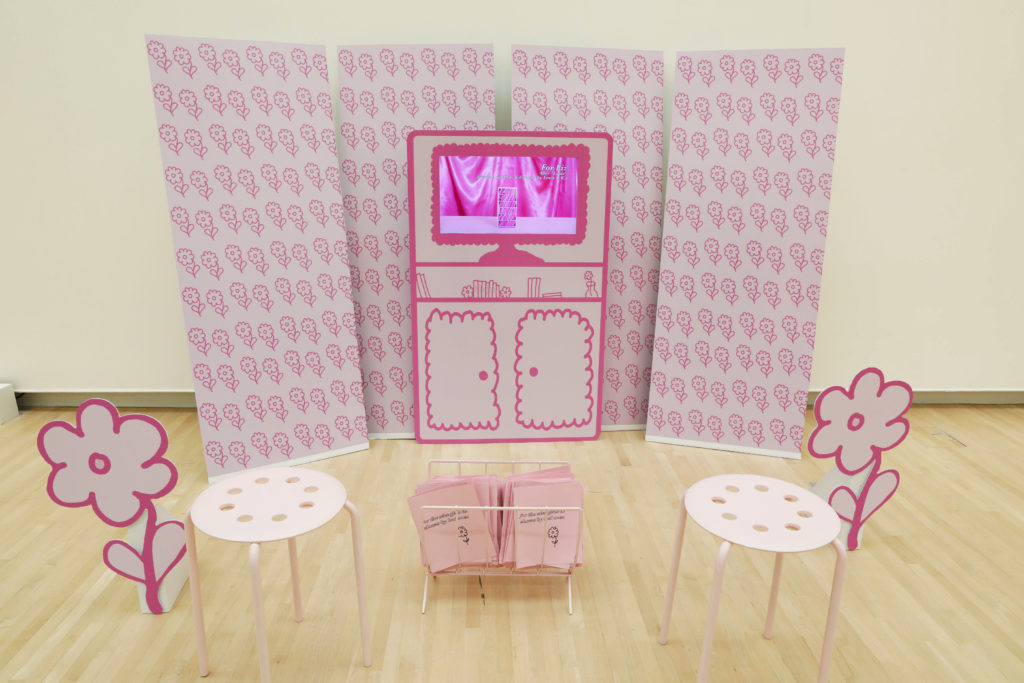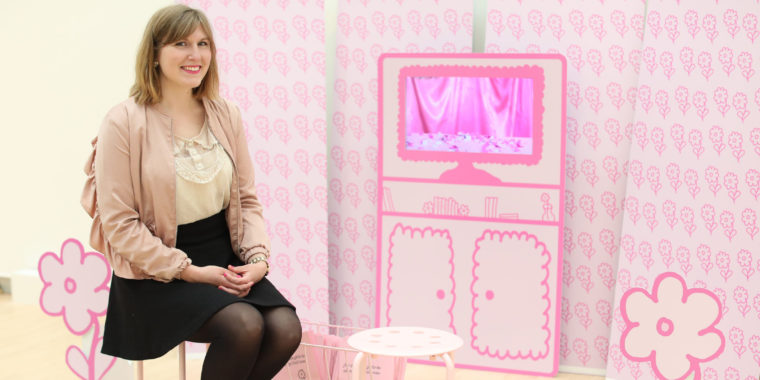When the trolls came for Taylor Yocom, she tried playing nice.
“I’d actually write them back!” she says with a rueful laugh. “That lasted about three days.”
It was spring 2015. “Guarded,” a photo series in which Yocom took portraits of women holding items kept for self-defense, had become a viral sensation. Admiring articles appeared everywhere from Bustle to USA Today to Vanity Fair Italy. A BuzzFeed feature drew more than a million views.
“It was surreal and great but also stressful, because I’d definitely been raised to be ‘the nice girl,’” said Yocom, a master of fine arts candidate in the Sam Fox School of Design & Visual Arts. “I felt I had to respond to everything.”
That reaction — the instinctive, culturally ingrained desire to please — is now the subject of Yocom’s thesis project, “For the nice girls in shows by bad men” (2018).
Currently on view in the Mildred Lane Kemper Art Museum, the eight-minute video installation presents a faux, set-like living room. Chairs, a cabinet, floral-print wallpaper and accompanying zines are rendered in shades of pink, magenta, lavender and bubble gum.
At center, a television monitor screens six vignettes. Each is based on the work of a filmmaker whose personal and professional behavior has come under scrutiny as part of the #MeToo conversation.
“My research looks at the idea of gender performativity,” said Yocom, who graduates May 18. “In particular, I’ve been examining ‘female niceness’ — the expectation that women are supposed to be ‘nice’ — and how that’s exhibited socially, psychologically and linguistically.
“So I began looking at depictions of female niceness in films written, directed or produced by men who were outed by #MeToo,” she said. “There were weird commonalities, and disturbing moments that mostly have just been overlooked.
“If we can so easily ignore these cues in film, what does that say about the wider culture?”
It just wouldn’t shatter
Visually, “For the nice girls” mimics Old Hollywood glamour. Shiny pink satin, draped to resemble theater curtains, frames a series of small, often handmade props.
The first vignette, “For Tracy,” is inspired by Woody Allen’s “Manhattan.” The audio consists of Isaac, a twice-divorced 42-year-old writer, played by Allen, breaking up with Tracy, his 17-year-old girlfriend, played by Mariel Hemingway.
In Allen’s film, the breakup, which takes place over milkshakes, can seem bittersweet. In Yocom’s, the power dynamics are undisguised. Isaac badgers and justifies. Tracy pleads and weeps. “Leave me alone,” she says, Isaac’s hand never leaving her shoulder. “Leave me alone.”
Yocom illustrates Tracy’s frustration. As the vignette begins, a strawberry milkshake rests on a white lace doily, next to a stainless steel harmonica (like one that Tracy gives to Isaac). As Isaac talks — and talks, and talks — Yocom’s hand enters the shot, dumps the glass and smashes it into the instrument.
A similar ferocity animates “For Liz,” based on Louis C.K.’s formerly acclaimed TV show “Louie.” The middle-aged title character asks out a young bookstore clerk, played by Parker Posey. “Nothing horrible will happen,” Louie assures, while Liz mutely listens. “I’m attracted to you because you’re nice.”
“If you look back in the context of what Louis C.K. has done, it’s very eerie,” Yocom said. “So I made this tiny bookshelf with paper books — it took hours to put together. And then I just slammed it on the table. Books went flying everywhere.”
Other vignettes riff on films by James Toback, James Franco, Aziz Ansari and Harvey Weinstein. In each, the pattern holds. Verbatim clips sound while Yocom smashes a framed painting, a school folder, a shot glass, a cocktail tumbler.
The kicker?
“Nothing would break!” Yocom said, head shaking with exasperation. “I’m wearing safety goggles, waiting for glass to fly, and it just wouldn’t shatter.”

A new way to explore
“For a long time, I was intimidated by video,” Yocom said. “I didn’t feel I had the technical skills.”
But when she arrived at the Sam Fox School, Yocom served as teaching assistant for “Tale of Two Cities: Documenting Our Divides,” led by sculptor and filmmaker Denise Ward-Brown, associate professor of art. The experience helped Yocom sharpen her abilities, even as — or perhaps because — she worked with undergraduate students.
“It was scary but freeing,” Yocom said. “It’s a whole new way to visually explore.”
By the end of the semester, she had created “Just hold it out for prom” (2016), a witty, two-minute piece inspired by the sometimes bickering, sometimes apologetic texts she’d exchanged with a high school boyfriend.
“Facebook keeps everything,” she said. The finished piece shows Yocom donning her old prom dress and, with a pair of golden scissors, methodically cutting it to ribbons. “It was very simple,” she said, “but really satisfying.”
“Humor is important,” Yocom said. “I’m an open book. When something awkward or uncomfortable happens, my reflex is to joke about it. Humor can be cathartic. But it has to be anchored in my own experience. I would never make light of what another person has gone through.”
That distinction, at once emotionally clear and morally rigorous, is central to Yocom’s work. “For the nice girls” is a frank and heartfelt homage, not just to characters like Tracy and Liz — eternally constrained by manipulative scripts — but to the millions of women who’ve found strength in the #MeToo movement.
At the same time, Yocom recognizes that grand, operatic gestures — smash the symbols! — provide only partial satisfaction. Certain symbols refuse, infuriatingly, to be smashed.
“At first I was really frustrated, but now I think it’s kind of poetic,” Yocom said. “#MeToo has relied on women’s anger, but we keep waiting for this moment, this release, that never happens.
“Nothing will really change until we change the culture.”
